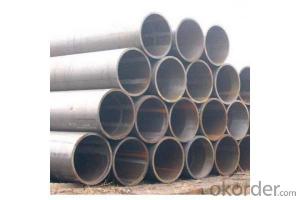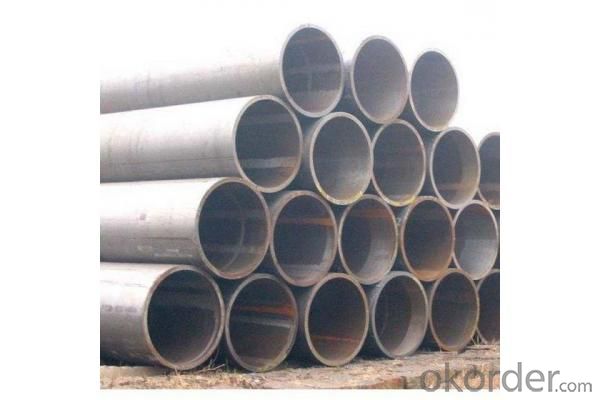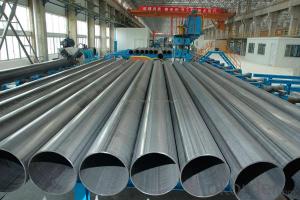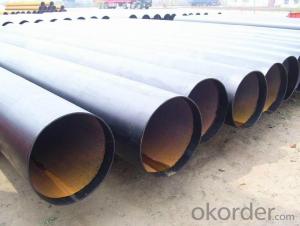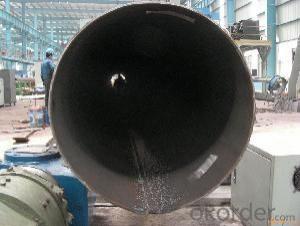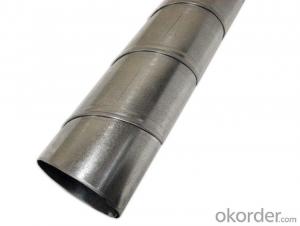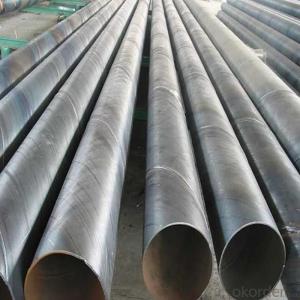LSAW SSAW CARBON STEEL PIPE ASTM API 16‘’ 20‘’ 24‘’
- Loading Port:
- Tianjin
- Payment Terms:
- TT OR LC
- Min Order Qty:
- 5 m.t.
- Supply Capability:
- 3000 m.t./month
OKorder Service Pledge
OKorder Financial Service
You Might Also Like
Packaging & Delivery
Packaging Detail: | Normal exporting packing,in container or bulk vessel or as per clients' request |
Delivery Detail: | 2 months after confimed contract |
Specifications
Large Diameter API 5L X70 PSL2 LSAW Steel Pipe
Grade: X42, X46, X50, X52, X60, B, C
OD: 1.5"-28"
WT: SCH10-SCH160
Large Diameter API 5L X70 PSL2 LSAW Steel Pipe
Specifications:
u Standard: API 5L
u Grade: B, C, X42, X46, X50, X52, X56, X60, X65, X70, X80
u OD: 1.5"-28"
u WT: SCH10-SCH160
u Length: 5-12m
u Ends Finish: plain end, bevel end, grooved end
u Surface Treatment: bare, black varnished, oiled finish, red color, anti-corrosion, 3PE, FBE or epoxy coating
u Technique: hot rolled or cold drawn
u Application: api 5l steel pipe for conveying oil, water, gas
u Invoicing: based on theoretical weight or actual weight
u Payment Terms: L/C at sight, T/T or Western Union
u Trade Terms: FOB, CFR, CIF
u Certification: ABS manufacturing assessment, ABS design assessment, API 5CT, API 5L, DNV manufacturer certificate, ISO9001 quality management system certificate, ISO14001 environment management system certificate, GB/T28001 occupational health and safety management system certificate, A1 class manufacturing license of special equipment certificate, CCS, GL, LR, SGS, TüV, PDE
- Q: Material of welded steel pipe
- GB/T14980-1994 (large diameter welded pipe for low pressure fluid delivery). Mainly used to transport water, sewage, gas, air, heating, steam and other low-pressure fluid and other uses. Its representative material is Q235 grade a steel.GB/T12770-1991 (stainless steel welded pipe for mechanical structure). Mainly used in machinery, automobiles, bicycles, furniture, hotels and restaurants, decorations and other mechanical parts and structures. Its representative material 0Cr13, 1Cr17, 00Cr19Ni11, 1Cr18Ni9, 0Cr18Ni11Nb and so on.
- Q: What does GALV mean in a steel tube?
- GALV is the abbreviation of English galvanized (Galvanized), which means galvanized steel pipe.
- Q: What is the difference between black steel pipes and galvanized steel pipes?
- The main difference between black steel pipes and galvanized steel pipes lies in their coating. Black steel pipes are uncoated and have a dark, iron oxide layer on their surface, while galvanized steel pipes are coated with a layer of zinc to protect against corrosion. This zinc coating gives galvanized pipes a shiny, silver appearance and makes them more resistant to rust and other environmental factors.
- Q: How do you select the right size of steel pipe for a project?
- To select the right size of steel pipe for a project, it is important to consider factors such as the desired flow rate, pressure requirements, fluid type, and the overall structural design. Consulting relevant design codes and standards, performing calculations based on these parameters, and seeking expert advice can help ensure the appropriate size is chosen to meet the project's specific needs.
- Q: What is the average lead time for manufacturing steel pipes?
- The average lead time for manufacturing steel pipes can vary depending on several factors such as the complexity of the design, size of the order, and the specific production capabilities of the manufacturer. Typically, it can range from a few weeks to a few months.
- Q: What is the composition of steel pipes?
- Steel pipes are primarily composed of iron and carbon, with small amounts of other elements such as manganese, silicon, and traces of sulfur and phosphorus.
- Q: What are the different coating options available for steel pipes?
- Some of the different coating options available for steel pipes include epoxy coatings, polyurethane coatings, fusion-bonded epoxy coatings, zinc coatings, and asphalt coatings.
- Q: What are the factors affecting the durability of steel pipes?
- The factors affecting the durability of steel pipes include corrosion, temperature, pressure, mechanical stress, and the quality of the protective coatings or linings applied to the pipes. Additionally, the composition and purity of the steel used in the pipes, as well as the design and construction of the pipeline system, can also impact its durability.
- Q: How are steel pipes used in the manufacturing of shipbuilding?
- Steel pipes are used in shipbuilding for various purposes such as constructing the ship's hull, piping systems for fuel and water transport, ventilation systems, and structural support. They provide strength, durability, and corrosion resistance, making them essential components in the construction and operation of ships.
- Q: Can steel pipes be used for structural purposes?
- Yes, steel pipes can be used for structural purposes. They are often used in construction projects to create strong and durable building frameworks, as well as in various engineering applications where load-bearing capacity is required.
Send your message to us
LSAW SSAW CARBON STEEL PIPE ASTM API 16‘’ 20‘’ 24‘’
- Loading Port:
- Tianjin
- Payment Terms:
- TT OR LC
- Min Order Qty:
- 5 m.t.
- Supply Capability:
- 3000 m.t./month
OKorder Service Pledge
OKorder Financial Service
Similar products
Hot products
Hot Searches
Related keywords
